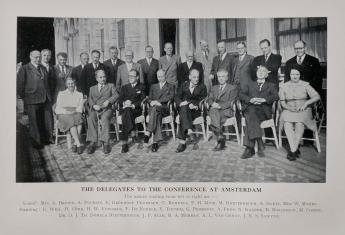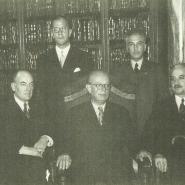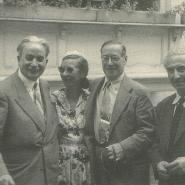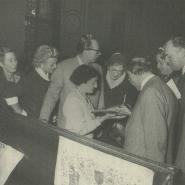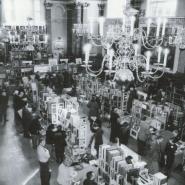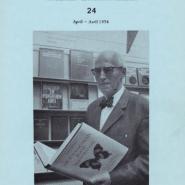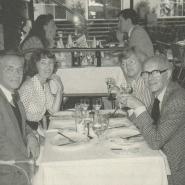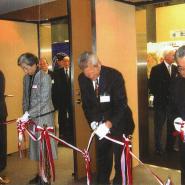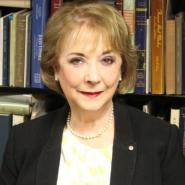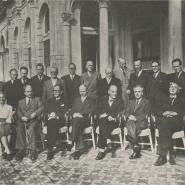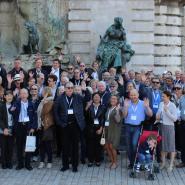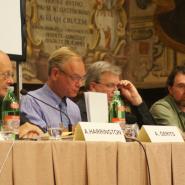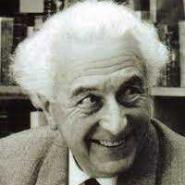La LILA: Une Chronologie
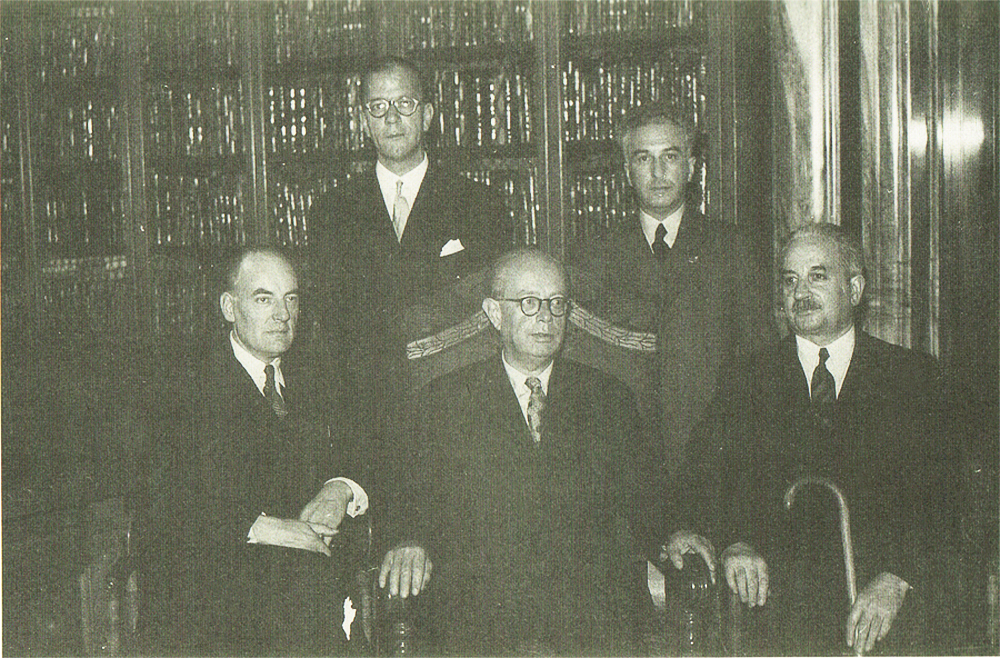
1948
Copenhagen 1948
The ILAB was formally incorporated in Copenhagen in September 1948, with ten participating countries. Representatives from Belgium, Finland, Switzerland, and Italy joined their colleagues from Great Britain, France, Sweden, Denmark and The Netherlands at the conference table. Denmark was holding a proxy for Norway. Menno Hertzberger proposed William S. Kundig as ILAB’s first president. Kundig, “a man with authority, position, and money ... a good host and a first-class raconteur” (Kaye) was unanimously elected. The first ILAB Committee consisted of William S. Kundig (President), Percy H. Muir (Vice-President), Menno Hertzberger, Einar Grønholt-Pedersen, André Poursin.
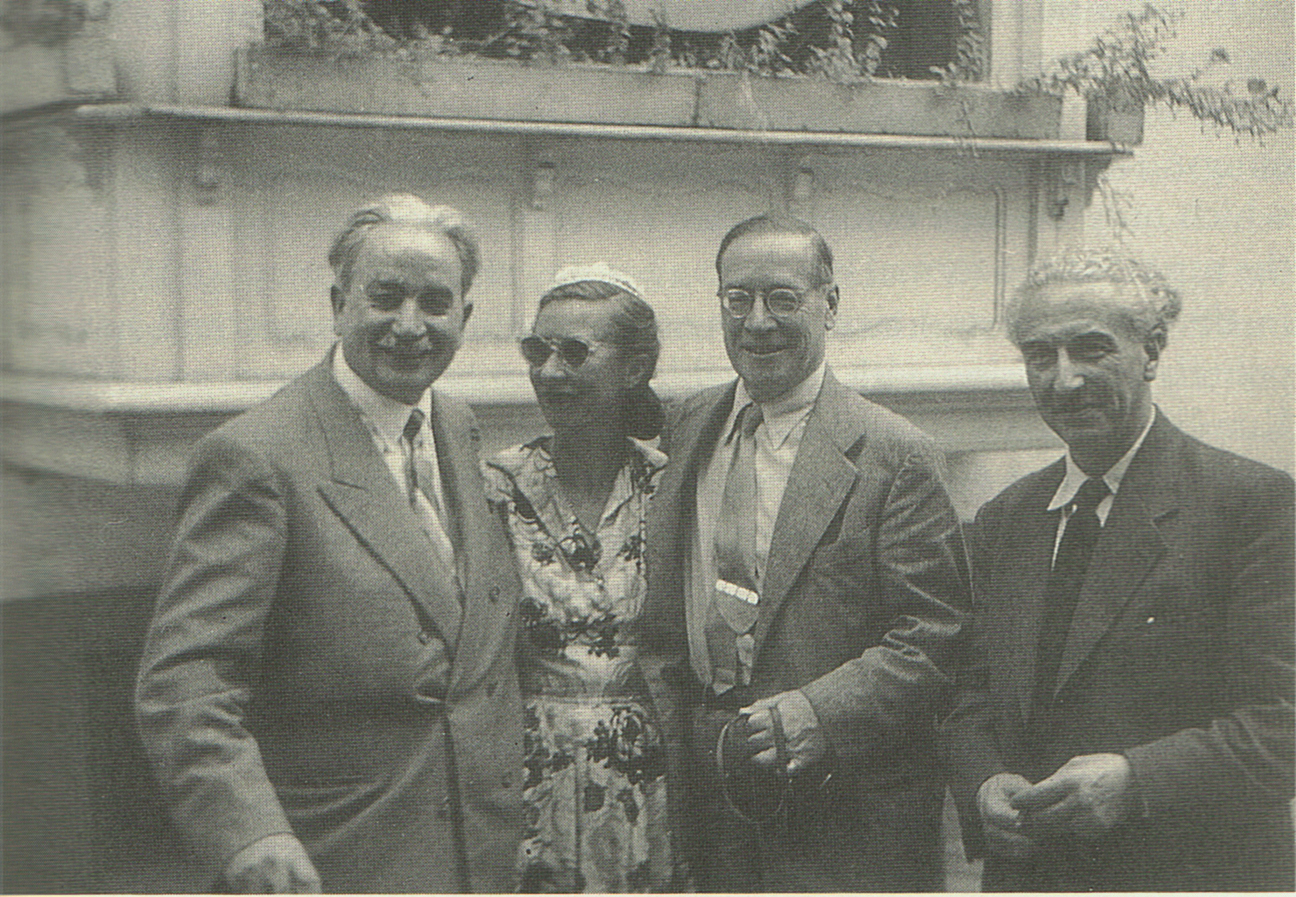
1949-1950
Early Years
During the first years the ILAB Committee Meetings were held in Switzerland, most of the time at the President’s office. William Kundig’s authority was legendary, as well as his generosity, when the right decisions were finally taken. On one occasion the committee members found a box of Havana cigars on the breakfast table after an exhausting meeting the night before: “With the compliments of your President.”
“William Kundig was the right man for the presidency of the League in its infancy. Certainly the greatest of his achievements was to compel the Americans to form an association and to affiliate to the League.” (Muir)
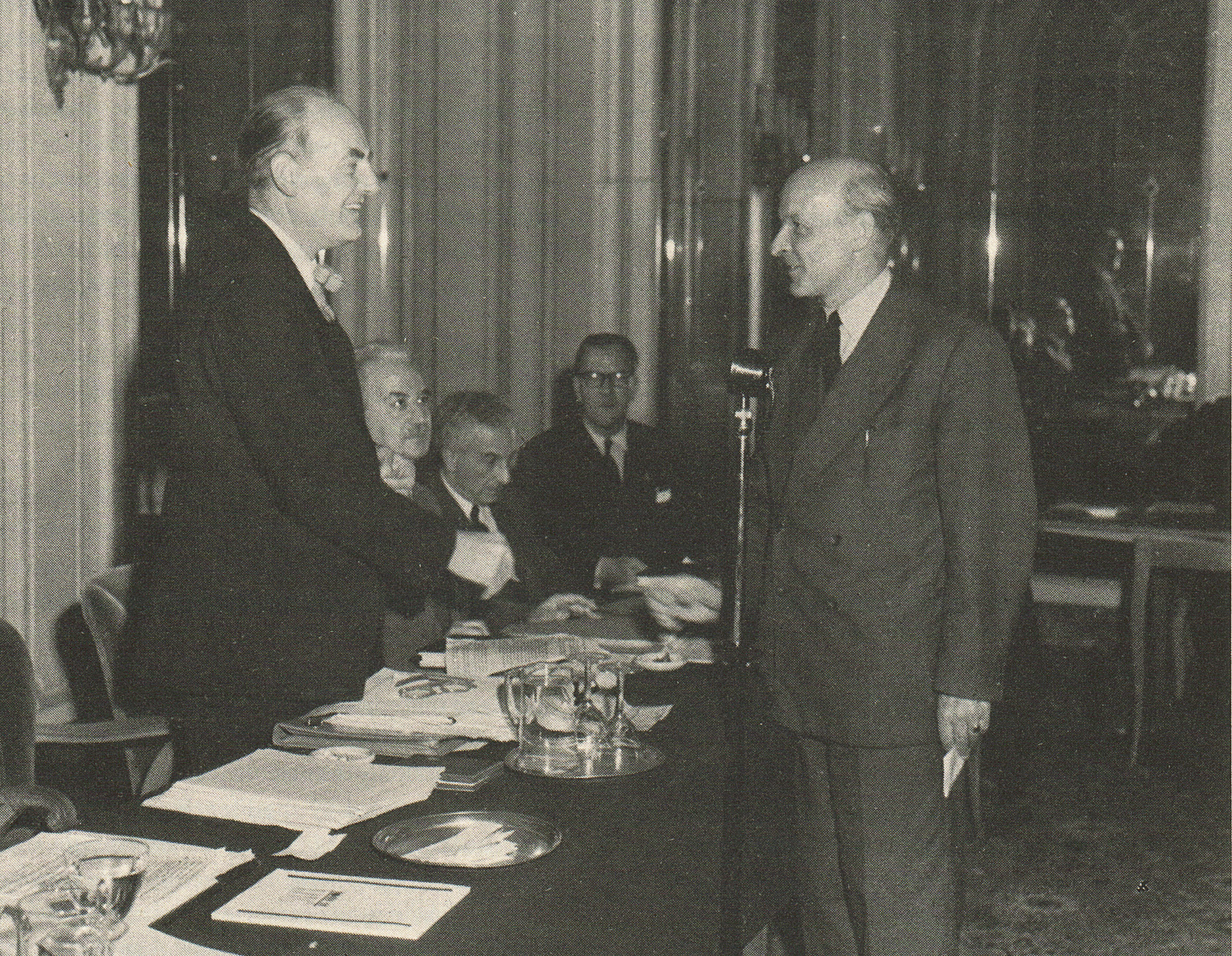
1951-1960
1950 – 1960
“Considering the dubiety with which our activities were treated it is pleasant to record that the Congresses in London in 1949 and in Paris in 1950 were very successful both socially and professionally, while the standard of hospitality in both cities was impeccable." (Muir)
More congresses worth remembering followed in Brussels 1951, Geneva 1952, Milan 1953, Vienna 1954, Munich 1957. The ABAA hosted two conferences in New York 1955 and 1959. London, however, became the unofficial meeting place for ILAB booksellers: After 1949 the ABA hosted two further events in the British capital: 1956 and 1958.
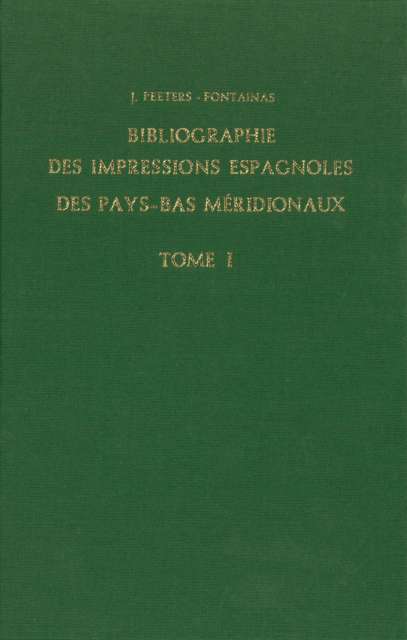
1961-1970
ILAB Breslauer Prize for Bibliography
The admission of Japan, the ILAB Bibliography Prize (now ILAB Breslauer Prize for Bibliography) and the first ILAB International Antiquarian Book Fair were the milestones of the 60s.
“Dans le monde du livre ancien et de la recherche bibliographique, deux personnages sont, jours après jours, confrontés à des problèmes de recherche, d’identification et d’évaluation d’oeuvres anciennes, précieuses ou non: Le Conservateur de bibliothèque et le libraire antiquaire. Le second, tout particulièrement, car de sa science et de ses connaissences dépendent son commerce et sa réputation.“ (Georges A. Deny)
Georges A. Deny from Brussels was ILAB President from 1960 to 1965 and the first Secretary of the ILAB Breslauer Prize for Bibliography who laid down the ground rules. The Prize is awarded every fourth year to the author of the most original and outstanding study in bibliography. Deny supervised the first and second awards to Jean Peeters-Fontainas “Bibliographie des impressions Espagnoles aux Pays-Bas méridonaux” in 1967.
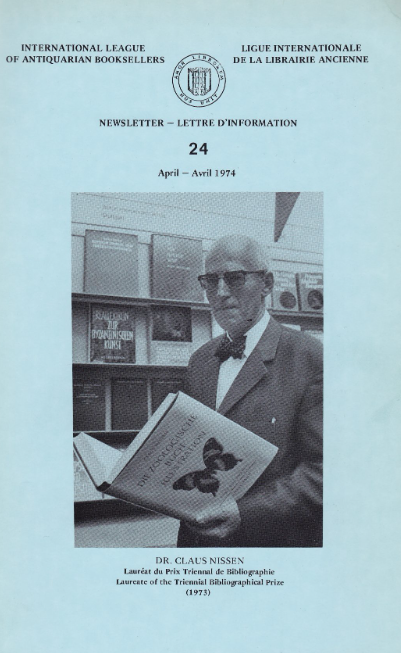
1971-1980
ILAB Down Under
Established in 1966, the Antiquarian Booksellers' Association of Canada (ABAC) or Association de la Librairie Ancienne du Canada (ALAC) became an ILAB member at the Paris Presidents’ Meeting in 1970. Australia followed eight years later. The Australian and New Zealand Association of Antiquarian Booksellers (ANZAAB), created in 1977, belongs to the League since 1978.
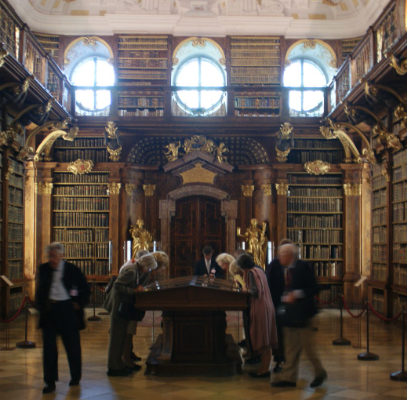
1981-1990
1980 – 1990
“By the 1980s the biennial congresses were attracting several hundred delegates. A certain amount of business gets transacted (the subjects cropping up most frequently being standards of collation, the training of new entrants to the trade, and relationships with the auction houses). Its harsher critics say that the League is only a talking-shop – and it is true that the social side of congress life is very pleasant, the national association sponsoring each congress taking great care to mount an interesting programme. Highlights have included a visit by private train to the library of Chatsworth, private concerts in the Fenice Theatre and Les Invalides, a barbecue on the Berkelouw’s farm near Sydney, a banquet in a palazzo on the Grand Canal, and the whole of our Japanese experience. Deserving special mention is an exhibition at L’Assemblée nationale in 1988, where the procèsverbal from the trial of Joan of Arc was put on display. Rumour had it that the personal intervention of François Mitterand, President of France, was needed for this treasure to be shown. In the atmosphere fostered by such enternments friendships are easily forged, which can only be a good thing.” (Anthony Rota)
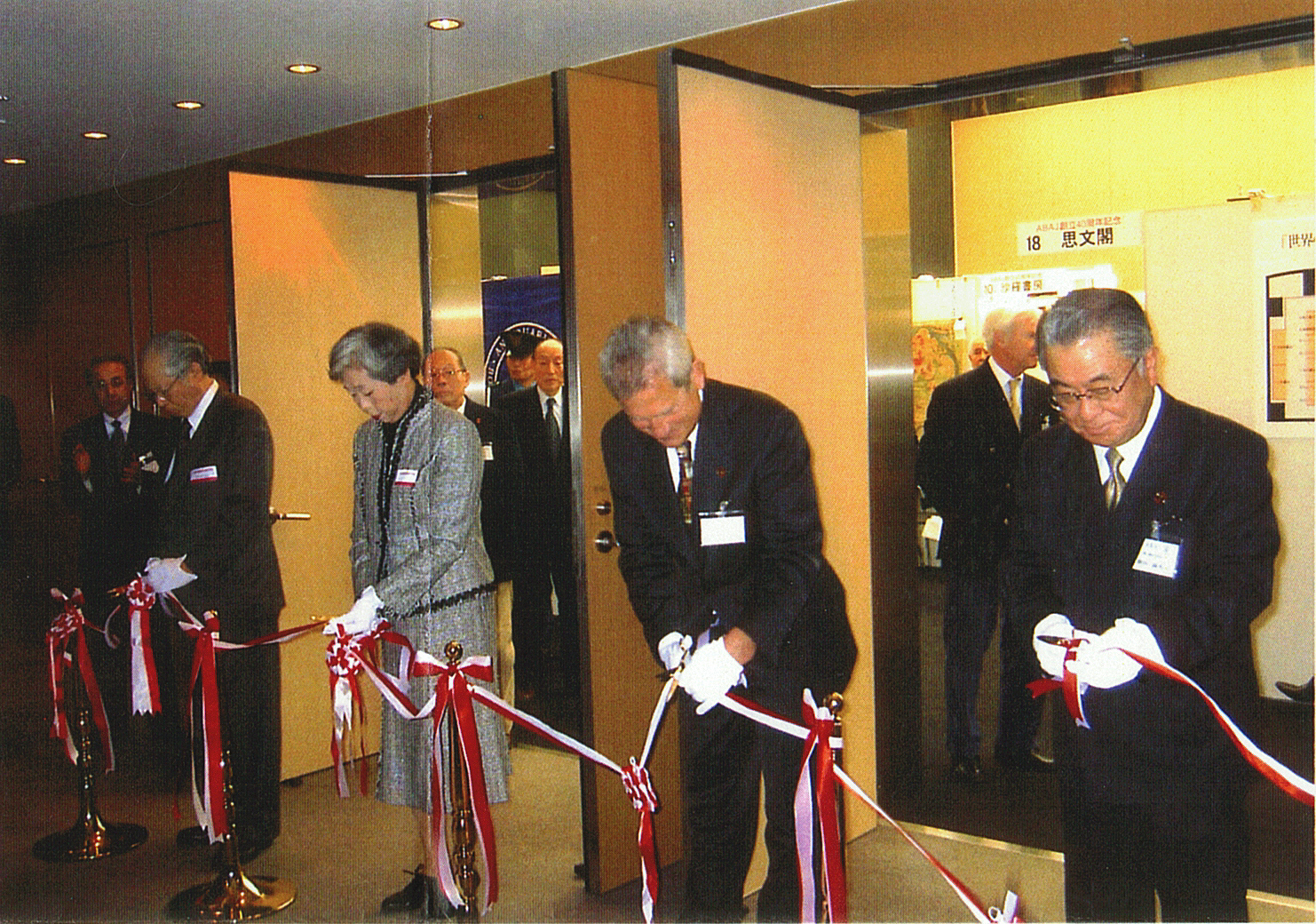
1991-2000
Expanding to the Global Market
During the 30th ILAB Congress and the 13th International Book Fair in Tokyo 1990 the Antiquarian Booksellers' Association of Korea (ABAK) were elected as the 18th ILAB member. Two years later Czech booksellers formed the Svaz Antikváru CR (SACR which joined the League during the 32nd ILAB Congress in Amsterdam in 1994. The Spanish Asociación Ibéria de Librerias Anticuarias (AILA), founded in 1990, also joined ILAB.
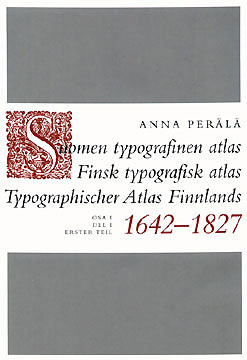
2001-2010
Kay Craddock
The beginning of the 21st century saw the first woman at the head of the League: Australian bookseller Kay Craddock was elected ILAB President during the Congress and the International Antiquarian Book Fair in Edinburgh 2000. Craddock, meanwhile ILAB President of Honour, was succeeded by Bob Fleck from 2002 to 2006, and Michael Steinbach 2006 from to 2008.
After the Boston Presidents' Meeting in 2001, the Danish, Swedish, Finnish and Norwegian associations organized a very special event: The 36th Congress and 19th International Antiquarian Book Fair took place in four countries, with a sea journey in between. On this occasion the 13th ILAB Bibliographical Prize of $10,000 was awarded to Anna Perälä, for her atlas of Finnish typography, 1642-1827, a monumental two volume work, published in Finnish, Swedish and German. Kay Craddock presented the award to Anna Perälä at a dinner in Helsinki.
In 2003 the Presidents travelled to Potsdam for their annual meeting, only a year later the ILAB affiliates met for a Congress and a Book Fair in Melbourne, well organized by the Australian and New Zealand Association of Antiquarian Booksellers (ANZAAB).
2004 saw the first Virtual ILAB Book Fair on the recently established ILAB website. The four day event included a beneficial auction for UNICEF, a book fair, lectures, appraisals, and a "Biblio Quiz" for book collectors. Presidents’ Meetings in Montréal 2005, Wilmington 2006, followed by the 21st International Antiquarian Book Fair in New York. Kay Craddock and Keith Fletcher were unanimously elected ILAB President and Member of Honour.
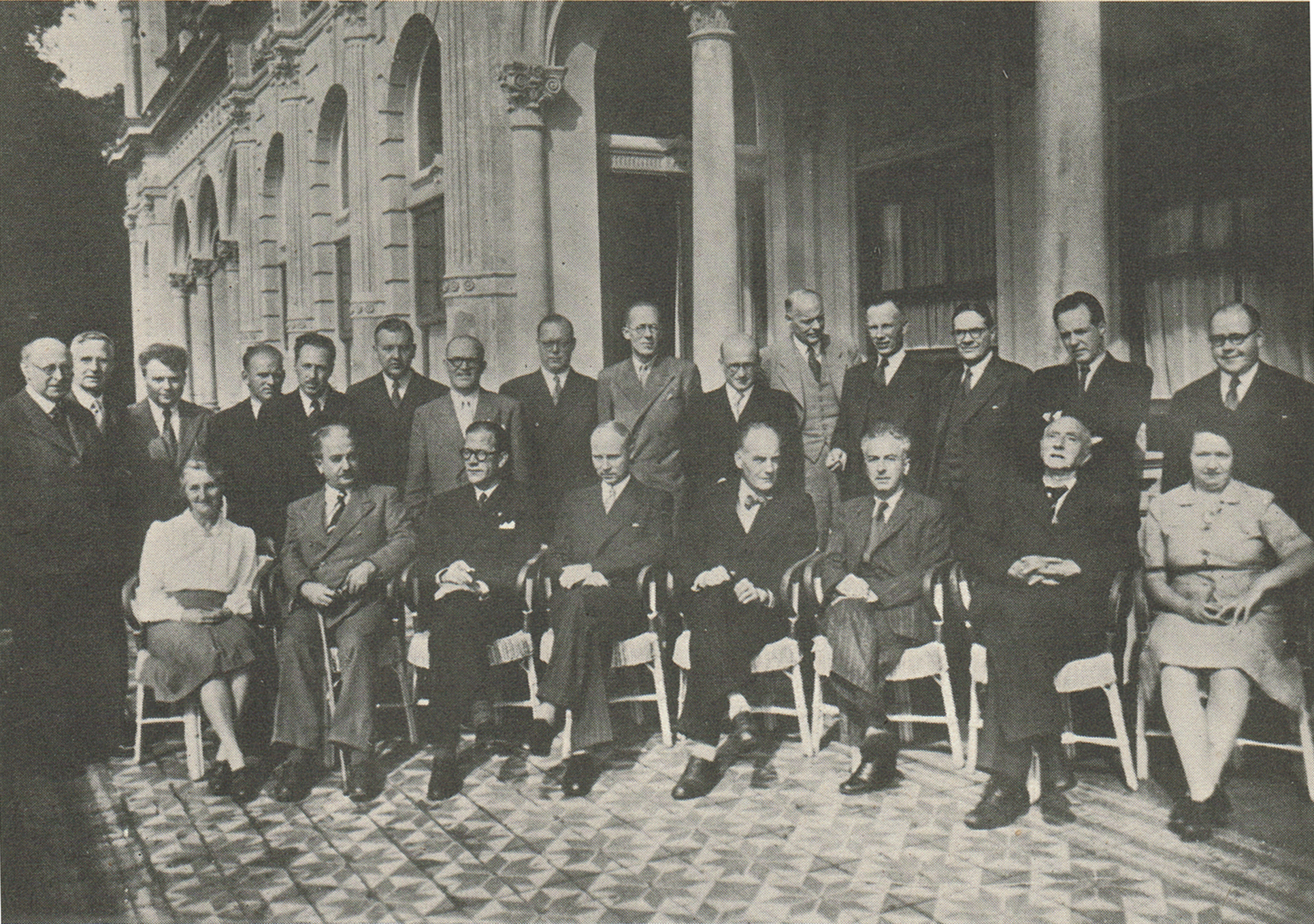
Amsterdam 1947
ORIGINS - 1947
Extracts from ABA Newsletters concerning the origins of the first ILAB Conference. (There is no other available source available at the moment about the first ILAB Conference of Amsterdam 1947 and the events leading up to it. If other documents are found, they will of course be added).
ABA (International) New Letter No. 5: Resumé of Meeting of September 18, 1946
DUTCH ANTIQUARIAN BOOKSELLERS’ ASSOCIATION. A letter was read from the Dutch Antiquarian Bookseller’s Association inviting us to arrange a conference in Holland in October to which representatives of antiquarian booksellers’ associations in other countries could be invited. It was suggested that in our capacity as an international organisation our representative should preside over the conference at which the problems and matters of interest to the trade should be discussed. Mr. Harris thought this was an opportune moment, but that we should need time to get things prepared. He suggested that an agenda should be formulated and that the President should go as our representative. The President agreed that such a meeting would have many advantages, but that the preparation required could not be completed in a few weeks. It was decided that Mr. Hertzberger, as Secretary of the Dutch Association, should be asked what countries would be interested. We regarded the proposition favourably and thought it might be possible to arrange for such a conference in the spring of next year. This would also give time for a representative from America to attend.
ABA (International) New Letter No. 5: Resumé of Meeting of October 9, 1946
DUTCH ANTIQUARIAN BOOKSELLERS’ ASSOCIATION. A letter from Mr. Hertzberger replying to that from the Association said that he hoped to be over in October when he would take the opportunity of discussing the proposed conference with us.
ABA (International) News Letter No. 7: Resumé of Meeting of February 5, 1947
DUTCH ANTIQUARIAN SOCIETY. A letter was read from the Dutch Antiquarian Society saying they had instituted a series of lectures over the next year for training in subjects relative to the trade. The President also read his reply which, on the proposal of Mr. Carter, is appended herewith.
Dear Mr. Hertzberger,
Holland and the Dutch Antiquarian Booksellers deserve the warmest possible congratulation for their enterprise in organising a comprehensive course of training for managers and assistants in the antiquarian trade. It has long been a cherished desire of my own that such a course of instruction should be available in this country. The war prevented its realisation here, and, indeed, preoccupation with national duties would have prevented many who would have benefited from the training from taking part in it.
Your splendid example, however, has revived my interest and I hope it will be an added inspiration to both your lecturers and their students to know that their enterprise has spurred on the parent organisation to follow their example.
The technique of our trade is highly specialized and there can be few retail trades in which anything like the same standard of expert knowledge is required. Nevertheless it remains a curious and inexplicable fact that, whereas technical training is available in almost every other kind of trade where special knowledge is required, in our own the only school is that of practical experience. Assistants have to pick up their knowledge as they go along, while at their daily work, surrounded by all the distractions of the bookshop routine. The remarkable fact is, not that the standard of expertise is so low, but on the contrary, that despite the haphazard methods and the inadequate means of obtaining information, there is so much highly technical knowledge scattered among members of the trade.
In the past, we have been enabled to get by because the bibliographical standards of collectors was also very low. It was the exception rather than the rule for a collector to have more than a casual acquaintance with the bibliography of his subject. Whether we like it or not - and some of us, alas, deplore and discourage the spread of information among collectors - the fact remains that this happy state of complaisant innocence on the part of collectors is disappearing and the future success of antiquarian bookselling will inevitably be increasingly dependent upon and in direct proportion to the expertise of the dealer and his staff.
Furthermore the English trade has already experienced the gap created at the highest levels by the interruption caused by the war of 1914-18. There has been for several years past, an acute shortage of personnel capable of undertaking managerial duties in the rare book trade. This shortage must be generally accentuated by the longer and even more widespread inroad of the late war. The shortage is by no means peculiar to our trade. What has been peculiar to it so far has been the complete lack of machinery to cope with the position. Whereas most other trades are almost feverishly competing for the services of technicians to provide expert training, ours is almost alone in regarding the prospect with complacency or defeatism.
Your prospectus makes it clear that you are fully seized of these and other apposite considerations and, in sending you our blessing and good wishes, I venture to repeat my hope that your example will not lack imitators.
Yours truly,
P. H. Muir,
For Antiquarian Booksellers’ Association.
ABA (International) News Letter No. 7: Resumé of Meeting of April 17, 1947
DUTCH ANTIQUARIAN BOOKSELLERS’ ASSOCIATION. The President reported that Mr. Hertzberger was coming over and that he would be seeing him. The President’s suggestion that we might make up a party to attend the International Conference of Booksellers was approved.
ABA (International) News Letter No. 7: Annual General Meeting, May 22, 1947
Another project which he had in mind was a course of instruction for assistants. The Dutch has instituted a very elaborate series of lectures and he thought we ought to make an effort to help our own assistants.
ABA (International) News Letter No. 8: Resumé of Meeting of June 12, 1947
INTERNATIONAL CONFERENCE. The President reported that Mr. Hezrtzberger had suggested that we, as the parent organisation, should issue the invitations to the International Conference which would be held at Amsterdam, and also ask the various Associations for suggestions for an Agenda. Mr. Carter asked if the fact that we issued the invitations made us responsible for the conduct of the Conference. The President said he thought Mr. Hertzberger would house it but that we should take charge. Mr. Stevens thought it should be held in London, but Mr. Muir said, that except for ourselves, it would be easier for all the other countries if it were held in Holland. Mr. Carter thought we should have our eyes open to the amount of work involved and Mr. Harris thought we should know what was the ground work of the Conference and the expenditure likely to be involved. The President replied that in a talk he had had with Mr. Hertzberger the idea of the Conference was to compare notes on practices in the trade and relations with our Boards of Trade and of the different regulations in operation regarding the export and import of books in various countries. Mr. Carter proposed that the President should be empowered to consult with Mr. Maggs and Mr. Goldschmidt and act in accordance with their decisions. Mr. Massey seconded this and it was carried.
ABA (International) News Letter No. 8: Resumé of Meeting of August 7, 1947
INTERNATIONAL CONFERENCE. The President reported that the sub-committee had met and that invitations had been sent out and most of the Associations have replied favourably.
ABA (International) News Letter No. 8: Resumé of Meeting of September 11, 1947
INTERNATIONAL CONFERENCE. Mr. Stevens proposed that the expenses of members going to the Conference should be paid by the Association up to a sum not exceeding £20, but Mr. Maggs said he thought the members were able to pay for themselves. Mr. Robinson thought that their railway fares would be a legitimate expense, but Mr. Cohen thought it would create a precedent. Mr. Carter said it was too late unless we had appointed a delegation to attend, to which all agreed. It was unanimously agreed that the expenses of the Secretary should be paid by the Association.
ABA (International) News Letter No. 9: Resumé of Meeting of October 9, 1947
CONFIDENTIAL BUSINESS occupied the greater part of the meeting.
ABA (International) News Letter No. 9: Resumé of Meeting of November 13, 1947
INTERNATIONAL CONFERENCE. The President reported that he had received a letter from the Dutch President asking that a meeting of Presidents should be called. It was agreed that a meeting of those Presidents who attended the International Conference at Amsterdam should be held in London and should coincide with the date of the social.
Apropos of the International Conference a letter from Mr. E. P. Goldschmidt to the President and his reply is appended.
18th October, 1947
Dear Muir,
In to-day’s Clique I read the Resolution passed at Amsterdam. If I had been present, I would have protested strongly against it wording, and I feel compelled to do so now.
“ ‘… although its members are merchants, nevertheless…’
“This deprecatory and apologetic attitude regarding our status as full members of the commercial community of this country is to my way of thinking not only offensive but disastrous.
“Great Britain, as well as Holland, are trading countries, and Trade, not Offiicaldom, is the backbone and mainstay of their existence. Until the booksellers and the other sections recover their self-respect and self-reliance as citizens, taxpayers and traders for their profit (their personal profit as well as the profit of the community of their residence), there can be no hope of recovery.
“Instead of this Resolution I would have proposed passing another, merely reaffirming our rights under Paragraph 41 of ‘Magna Charta’ which reads: ‘Omnes mercatores habeant…’ (I have no English translation handy, so I append my own version):
“ ‘All merchants shall have free and secure liberty to leave England and to come into England and to dwell and to travel about in England, by land as well as by water, in order to buy and to sell, without any harmful exactions (sine omnibus malis toltis) according to their ancient and righteous traditions, except in time of war for those who belong to the country at war with us.’
“This, I think, would have been sufficient and more to the purpose than a cringing apology for our existence.
Yours sincerely,
E. P. Goldschmidt.”
21st October, 1947
“Dear Goldschmidt,
“While I agree with all you say, I think you have taken the Resolution in the wrong way. The point was that a certain faction at the Conference wanted a high-falutin text which would have meant that we are not really merchants at all but disinterested servants of culture. I felt that we wanted something more realistic than this and I seem to hae fallen into an unfortunate wording.
“Yours Sincerely,
P. H. Muir”
ABA (International) News Letter No. 10: Resumé of Meeting of March 18, 1948
INTERNATIONAL CONFERENCE. A letter was read from the Danish Antiquarian Booksellers’ Association inviting members to the Second International Conference which it was suggested should be held in Copenhagen from September 1st to 5th, inclusive. The Danes also asked that the ABA, in view of their international experience, should conduct the conference and draw up the agenda. The President said that in the light of this letter, he thought the Committee should have some detailed proposition to discuss and he had therefore drawn up a possible agenda which had been sent to every Committee Member. The first item on this read, “Do you think a new international body is called for?” A long debate followed. Most members were in favour of co-operation with the organisations of other countries, but were of the opinion that it was risky to form an international body which might have power to dictate to national organisations. The ABA did not wish to lose its identity and become merely a national body. This would mean losing our American and other overseas members. Should an international organisation be constituted, voting powers of the delegates should be proportionate to the number of members in the individual associations. The President finally suggested that another meeting be held to which Mr. E. P. Goldschmidt and Mr. J. I. Davis be invited to give us the benefit of their European knowledge and experience. A resolution could then be formed and sent to Copenhagen. In the meantime we might inform the Danes that delegates would be sent to the conference with power to vote. The Committee agreed that the delegates should be the President and the Immediate Past President.
ABA (International) News Letter No. 10: Resumé of Meeting of April 14, 1948
INTERNATIONAL CONFERENCE. In response to the invitation issued by the Committee the President was glad to welcome Mr. E. P. Goldschmidt and Mr. J. I. Davis to this meeting. Before calling on them to speak, he opened the discussion by saying that the general feeling of the Committee seemed to be that a new international organisation was not needed. The Association had been doing international duties for so many years that it was part of our tradition. Mr. Fletcher had raised the important point that no impression should be given that we were against an international association of any kind but that a proposal should be made so that there would be no question of our being left outside any body which might be formed. Since the last meeting the President had given some thought to the forming of a resolution which the delegates could take to the Conference. In view of all the ground to be covered it was not possible to do this in a short resolution, so he proposed to re-open with a draft of the one he had framed. This he then read:-
In 1908 this Association, in response to applications for membership from all parts of the world, broadened its scope and assumed its present international title. For forty years it has carried out, to the best of its ability, the international implication of its title and it was therefore with especial enthusiasm that it responded to the initiative of the Dutch Association to call an international conference in 1947.
We, the Antiquarian Booksellers’ Association, are therefore fully seized of the important advantages to be gained from a deeper and closer liaison between the various national associations that have emulated our example.
We feel that this international spirit can best be fostered by the affiliation of other national associations to our own, thus preserving the continuity of international service which we have hitherto offered. To this end, we suggest that the Advisory Council of our Association be reconstituted so as to include two delegates from each existing national association, the corporate body thus formed to have power to co-opt two voting delegates from the USA and also, if they think fit, representation from other countries where no association at present exists.
We propose that voting powers on the reorganised Advisory Council be proportionate to membership, the delegates from each country to count one vote for every hundred members or fraction of one hundred. Thus, associations with one hundred members or less, would possess one vote: those with between one hundred and two hundred two votes, and so on.
The necessary finance to be provided in the same proportion at the rate of £20 (twenty pounds) per hundred members or fraction of one hundred.
The Secretary of the Advisory Council to be the Secretary of the Antiquarian Booksellers’ Association (Int.) for the time being and the sum of £80 per annum to be the honorarium for secretarial duties.
Mr. Goldschmidt approved the spirit of the resolution. He felt that co-operation between national associations was desirable, but he believed a superior body of national associations could only lead to deadlocks and quarrelling. The fundamental principle should be for booksellers to join their national associations. We should, however, stick to the point that we have always been a body membership of which is open to everybody. We should be willing to help other associations with their troubles, but could not make membership dependent on nationality. He was very much against a body of delegates forming resolutions which would bind associations; and he was also against the idea that this association should join some superior organisation to which it would have to apply for permission for anything it might want to do. He felt that as at present constituted some of the continental associations were not representative of the booksellers of their countries.
Mr. Davis endorsed Mr. Goldschmidt’s remarks, but thought the proportion of votes outlined in Mr. Muir’s resolution would give some countries overwhelming powers to the detriment of smaller countries. (There was considerable disagreement with this). Mr. Davis also said he thought that what was most required was a standard of conduct rather than fiscal reform.
The President in reply said that if we only wanted closer association on matters of honesty, reference and government regulations, we did not need the elaborate machinery of a new organisation. Mr. Davis said here was nothing to prevent anyone joining our association and getting all he wanted. Could not we do something more to encourage new members from other countries and we on our side join their associations.
Mr. Goldschmidt suggested a reduced subscription for non-English members, but this met with opposition. Mr. Stevens felt that some continental associations might think it infra dig for their association to be subsidiary to ours but not to an international one. The President agreed this might be so, but it could not be helped. Mr. Fletcher thought that while we ought to protect our own interests we should not give the impression that we were going to prevent any self-governing movement. He hoped that the continental associations would be willing to accept this new compromise. They might not want the work of starting a new body. He thought our delegates should be prepared for a stormy meeting.
The resolution was then re-read, and on the proposal of Mr. Stevens, that it should be brought before the members at the Annual General Meeting, was seconded by Miss Myers and carried.
ABA (International) News Letter No. 10: Annual General Meeting, May 6, 1948
The President went on to discuss the International Conference at Amsterdam. A second conference was being arranged and perhaps a few words of explanation were necessary. The Amsterdam Conference was of an exploratory nature to see how far the booksellers of the different countries could help one another. At the Conference the outlook of European Associations was more ambitious than ours and would have carried us beyond the wishes of the Committee, so that he was obliged to hedge a good deal. The next Conference was to take place in Copenhagen and the Committee had given much consideration to the relations between continental association and ourselves and he would place before them the Committee’s unanimous resolution which was as follows [see text of the resolution above].
The President then invited discussion on the proposed resolution. Mr. Joseph asked whether the visit to Denmark would benefit the English trade. The President replied that it was not a meeting between English and Danish traders, but a meeting of all the countries in which antiquarian booksellers associations existed. Apart from any formal meetings, the opportunity of getting to know our colleagues abroad would be pleasant and it was hoped that it would produce good results. It it were possible to have complete agreement with other countries it would greatly simplify inquiry into any complaints between booksellers which might arise. Mr. Carter said that surely it was the result of the lack of co-operation with continental booksellers which caused us not to do as much business as we should like. The call had been made and now was the time to respond. It was a mistake to take pride in our insularity and we should do anything within reason to prove our willingness to co-operate, sending our delegates armed with a mandate as to what we were prepared to do.
The President then moved that the resolution as read be adopted and it was carried unanimously.
ABA (International) News Letter No. 11: Resumé of Meeting of May 19, 1948
INTERNATIONAL CONFERENCE. Mr. Massey read a letter from the Danish Association in reply to the Resolution passed at the Annual General Meeting. It stated that the Resolution could not be accepted because it differed so much from the agreement regarding the formation of an international organisation reached at the Amsterdam Conference, 1947. Mr. Muir said that as the Resolution had been unanimously passed he did not think that we could have second thoughts about it. This was unanimously agreed to. Mr. Sawyer suggested that a letter reaffirming the Resolution should be written to the Danish Association. This was carried.
ABA (International) News Letter No. 11: Resumé of Meeting of June 17, 1948
INTERNATIONAL CONFERENCE. A letter was read from the Danish Association saying that although agreeing to most of the terms of our Resolution they could not accept the International organisation’s being merely a reconstruction of the British Association’s Advisory Council. It must, they thought, be an independent body. They also suggested that the British votes should be computed on their British members only. The Committee agreed that they could not withdraw on these points and it was decided that the Danish Association should be informed that unless the main basis of our resolution were agreed upon, it would be pointless for us to send representatives to the Conference.
ABA (International) News Letter No. 11: Resumé of the Emergency Meeting, June 22, 1948
An Emergency Meeting was held on June 22nd, 1948, to discuss the reply received from the Danish Association to our letter saying we were not willing to withdraw or amend our resolution on the formation of an International Association. The following were present: Mr. Massey (in the Chair), Miss Myers, Messrs. Carter, Harris, Hopkins, Maggs, Muir and Sawyer.
In their reply the Danish Association requested that our delegates attend the Conference because the British Resolution had been put on the printed agenda, which was ready for circulation. After reading the letter the President asked if the Committee wished the Association to be represented or not. Mr. Harris said the whole matter was most uncertain and it was doubtful whether it would be of advantage to the Association or warrant the expense of sending delegates. The President said the first thing was to decide whether we were going to be represented or not. Mr. Harris asked who was going to be represented from other countries. Mr. Massey said he presumed the same countries who attended the Amsterdam conference. Mr. Muir said that he thought it was very difficult not to go at this stage. A Resolution had been sent to the Danes and there had been a good deal of correspondence with them. They had agreed that the Conference would not succeed unless we were represented there. The Danes had gone to a great deal of trouble and he felt that it was a bit late in the day to withdraw. If we were not represented, and our resolution was on the agenda, it would go by default. Mr. Maggs wanted to know how votes were allocated. Mr. Muir said that was one of the bones of contention, but that the other associations could not do much without us as we were the most important and the only international organisation. He thought we should go. Mr. Harris said he would be guided by Mr. Muir who had done so much in the matter. Mr. Muir went on to say that we must bear in mind if our resolution was accepted and we were to become the organisation to which the others would be affiliated, it would give us prestige. Mr. Harris asked if it warranted the expense. He took it for granted Mr. Muir would go as our representative and Mr. Massey should go as President of the Association. Mr. Massey suggested that Mr. Muir should be delegated to represent the Association and he thought it would be sufficient if he went. Mr. Maggs said the President should certainly go. Mr Muir said that if the President did not go it would be regarded as a slight. He also thought the Secretary should go. Mr. Harris asked if we were justified in undertaking the expense for three. Mr. Carter thought it was perfectly justified. Should the other associations not be willing to fall in with our resolution it would certainly fail if we were not there to back it up. He thought Mr. Massey should go as the President and Mr. Muir as the delegate and if our resolution should be adopted then he thought Mrs. Brown ought to be on hand. If our Association is to take its place in an organised body then we should be prepared to back up our views, and our delegation should be strong enough to explain the resolution and endeavour to get it accepted. If things went wrong it ought not to be for want of effort on our part. We should only lose face if we backed out when we were criticised. Mr. Maggs agreed and said he thought we were committed to it. It was then unanimously agreed on the proposal of Mr. Carter, seconded by Mr. Sawyer that we should send Mr. Massey and Mr. Muir as delegates and that Mrs. Brown should also attend. Mr. Muir asked that this be put on the agenda of the next Committee meeting so that if any members of the Committee who were not present to-day, wished to raise any objections these could be heard. Mr. Carter said that consideration should be given the to the sort of general directive the Committee would want to give to our delegates about the resolution. The question of expenses was also left till the next meeting.
ABA (International) News Letter No. 11: Resumé of Meeting of August 12, 1948
DANISH CONFERENCE. After the Minutes of the Emergency Meeting on June 22nd had been read, the President asked the Committee to ratify the decisions regarding the Danish Conference reached at that Meeting. Mr. Harris and Mr. Carter explained to those members who were not at the Emergency Meeting that the general feeling was that we were in honour bound to support our resolution and that the two delegates we were sending should have their expenses paid by the Association. There was some discussion about the limitation of expenses, but it was finally agreed, on the proposal of Mr. Howes, seconded by Mr. Miller, that the Minutes of the Emergency Meeting be ratified and that the question of expenses be left to the discretion of the delegates.
Mr. Massey then asked for some briefing on the matter of the resolution. Mr. Howes said he thought the delegates were well aware of the feeling of the Committee and it could be left to them to act on their own initiative. Mr. Muir asked if that meant standing by our resolution and the reply was “Yes”. Mr. Fletcher asked that should it become apparent during the course of the Conference that another International Association would be set up without us, was it our intention to allow this to happen? Mr. Carter said that presumably the general mandate was to persuade others to our way of thinking or a compromise, as he thought it hardly likely we should get our resolution accepted as it stood. Mr. Muir said he thought he was sufficiently aware of the feelings of the Committee and if necessary, we could give way on some points. Mr. Fletcher proposed that if after the Conference had gone on for some days it became clearly apparent to our two delegates that we should not get what we wanted, they should make a decision to get the matter deferred for twelve months and then to have a conference in London so that the matter could finally be debated on our own ground. This was seconded by Mr. Carter and carried unanimously. Mr. Crudgington asked what would happen if the whole thing were turned down. Mr. Fletcher thought that hardly likely but we were leaving the door open.
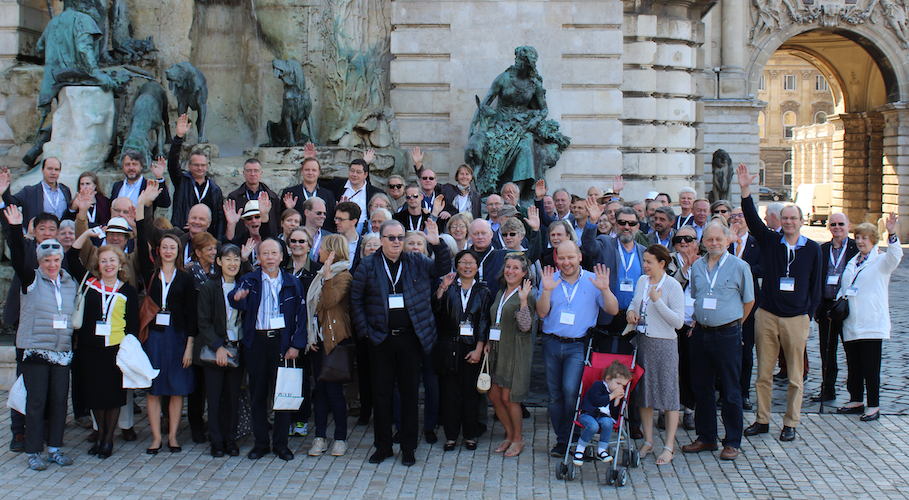
An overview of all ILAB Congresses & Presidents' Meetings since 1947
1947 - Amsterdam - Preliminary conference
1948 - Copenhagen - 1st Congress
1949 - London - 2nd Congress
1950 - Paris - 3rd Congress
1951 - Brussels - 4th Congress
1952 - Geneva - 5th Congress
1953 - Milan - 6th Congress
1954 - Vienna - 7th Congress
1955 - New York - 8th Congress
1956 - London - 9th Congress
1957 - Munich - 10th Congress
1958 - London - 11th Congress
1959 - New York - 12th Congress
1960 - Scheveningen - 13th Congress
1961 - Paris - 14th Congress
1962 - Basel - 15th Congress
1963 - Brussels - 16th Congress
1964 - Ravenna - 17th Congress
1965 - Amsterdam - 1st International Book Fair
1965 - Stuttgart - Presidents' Meeting
1966 - Vienna - 18th Congress
1967 - San Francisco - 19th Congress and 2nd International Book Fair
1968 - Amsterdam - 3rd International Book Fair
1968 - London - Presidents' Meeting
1969 - Copenhagen - 20th Congress
1970 - Paris - Presidents' Meeting
1971 - London - 21st Congress and 4th International Book Fair
1972 - Vienna - Presidents' Meeting
1973 - Tokyo - 22nd Congress and 5th International Book Fair
1974 - Turin - Presidents' Meeting
1975 - Amsterdam - 23rd Congress and 6th International Book Fair
1976 - Brussels - Presidents' Meeting
1977 - Düsseldorf - 7th International Book Fair
1978 - Zurich - 25th Congress and 8th International Book Fair
1979 - Copenhagen - Presidents' Meeting
1980 - New York - 26th Congress and 9th International Book Fair
1981 - Kyoto - Presidents' Meeting
1982 - Amsterdam - Presidents' Meeting
1983 - Stockholm - Presidents' Meeting
1984 - London - 27th Congress and 10th International Book Fair
1985 - Munich - Presidents' Meeting
1986 - Venice - 28th Congress and 11th International Book Fair
1987 - Vienna - Presidents' Meeting
1988 - Paris - 29th Congress and 12th International Book Fair
1989 - Yverdon - Presidents' Meeting
1990 - Tokyo - 30th Congress and 13th International Book Fair
1991 - Copenhagen - Presidents' Meeting
1992 - Cologne - 31st Congress and 14th International Book Fair
1993 - Los Angeles - Presidents' Meeting
1994 - Amsterdam - 32nd Congress and 15th International Book Fair
1995 - Brussels - Presidents' Meeting
1996 - Los Angeles - 33rd Congress and San Francisco, 16th International Book Fair
1997 - Sydney - Presidents' Meeting
1998 - Vienna - 34th Congress and 17th International Book Fair
1999 - Florence - Presidents' Meeting
2000 - Edinburgh - 35th Congress and 18th International Book Fair
2001 - Boston - Presidents' Meeting
2002 - Scandinavia - 36th Congress and 19th International Book Fair
2003 - Potsdam - Presidents' Meeting
2004 - Melbourne - 37th Congress and 20th International Book Fair
2005 - Montréal - Presidents' Meeting
2006 - Wilmington - Presidents' Meeting
2006 - New York - 21st International Book Fair
2007 - Paris - Presidents' Meeting
2008 - Madrid - 38th Congress and 22nd International Book Fair
2009 - Vienna - Presidents' Meeting
2010 - Bologna - 39th Congress and 23rd International Antiquarian Book Fair
2011 - Weimar - Presidents' Meeting
2012 - Lucerne, Zurich - 40th Congress and 24th International Antiquarian Book Fair
2013 - Siena - Presidents' Meeting
2014 - Paris - 41th ILAB Congress and 25th International Antiquarian Book Fair
2015 - Seville - Presidents' Meeting
2016 - Budapest - 42nd ILAB Congress and 26th International Antiquarian Book Fair
2017 - Copenhagen - Presidents' Meeting
2018 - Los Angeles - 43rd ILAB Congress
2019 - Tbilisi, Georgia - Presidents' Meeting
2020 - Amsterdam - 44th Congress (cancelled due to COVID crisis)
Next:
2021 - Stockholm - Presidents' Meeting
2022 - Oxford - 44th ILAB Congress
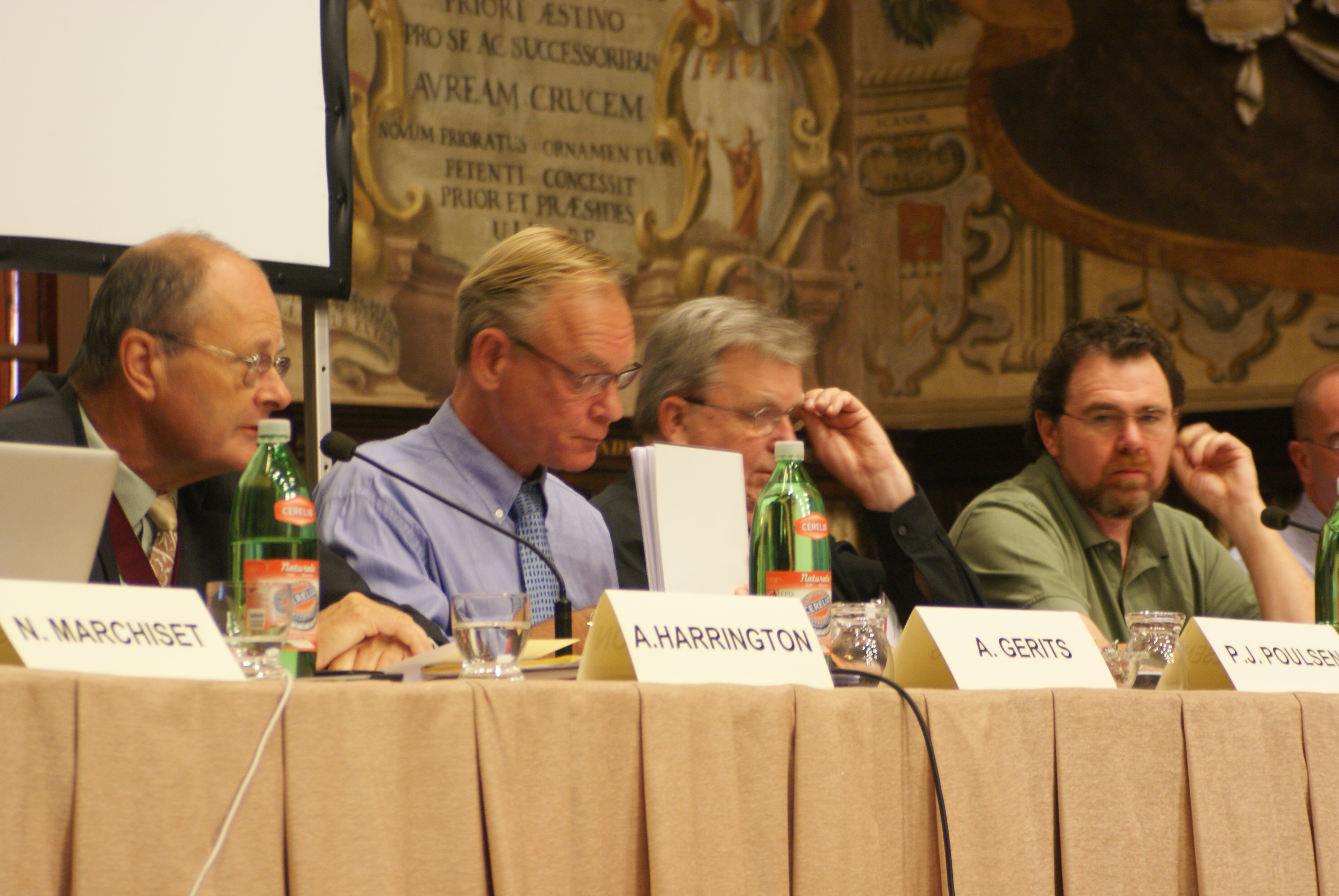
ILAB Past Presidents
 Chairman Preliminary Conference 1947
Chairman Preliminary Conference 1947
Percy H. Muir
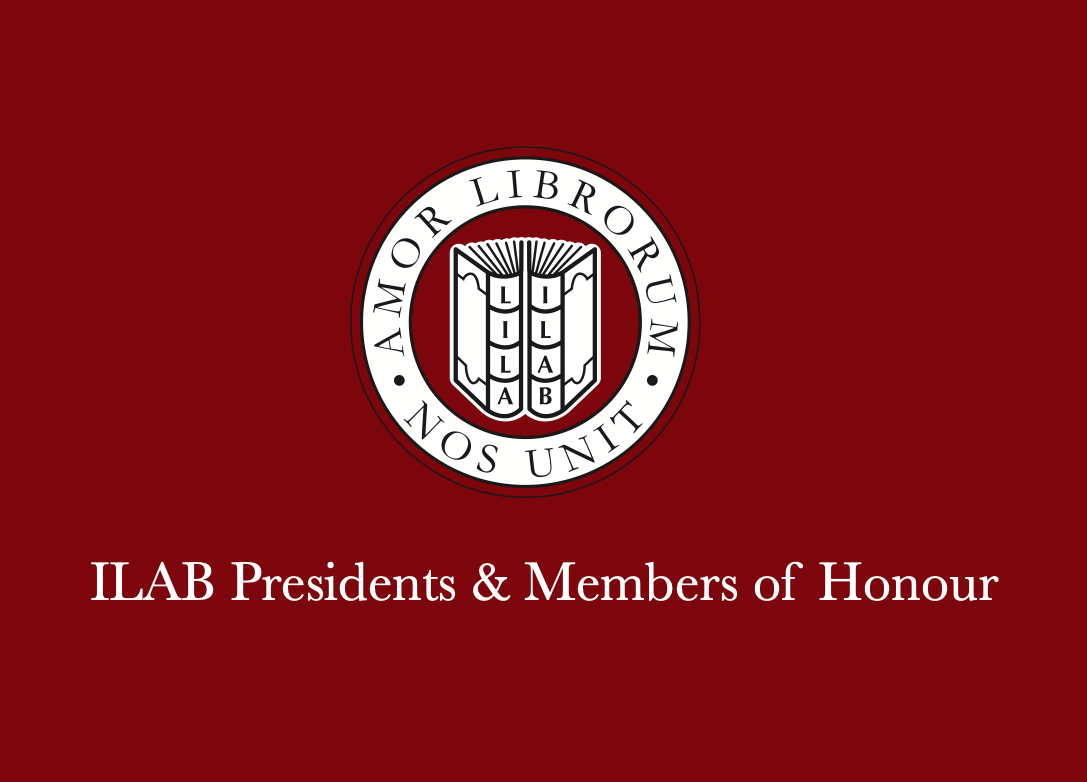
ILAB Presidents & Members of Honour
 Father of the League
Father of the League
Menno Hertzberger

